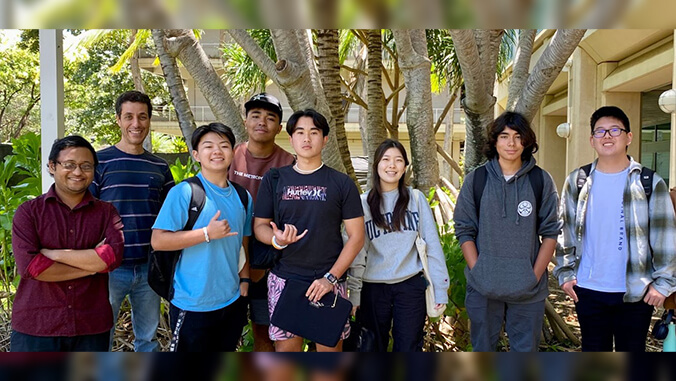
Utilizing artificial intelligence (AI) to its fullest potential, seven high school students developed a mobile app that tracks expenses—all within a two-week timeframe. Through an internship with U.S. Department of Education Native Hawaiian Education Act grant grantee, Project Hōkūlani, at the Center on Disability Studies (CDS) in the University of Hawaiʻi at Mānoa College of Education (COE), this second cohort of students gained a unique computer science experience that enabled them to advance their STEM skills.
During summer 2023, the student interns built a mobile application named RESHEIPT at the UH Laboratory of Applications in Informatics and Analytics. The students were each paid a $1,000 stipend for 48 hours of work at the computer lab.
Designed to gather expenses one receipt at a time, they created the app using ChatGPT under the guidance of Assistant Professor Mahdi Belcaid (Information and Computer Sciences, Hawaiʻi Institute of Marine Biology, Hawaiʻi Data Science Institute) and Akib Sadmanee, a research graduate assistant with Pacific Ocean Science and Technology.
Students used ChatGPT to complete tasks that would have traditionally required much more time from machine learning experts or programmers.
“The group wanted to include artificial intelligence in their computer studies, and the app delivers just that,” said CDS Assistant Specialist Lisa Galloway. “The app allows users to scan their receipts, providing them with an itemized overview of their transactions. AI comes in when users are processing and itemizing their receipts with ChatGPT.”
They also learned how to use no-code platforms, including Amazon Web Services, to construct the features of the app, such as authentication and storage.
“This product highlights the impact of AI and specifically large language models on technology,” said Belcaid. “If high school students can develop such a complex application in just 40 hours—much of which was devoted to education rather than coding—imagine the technological possibilities that await us as ChatGPT and similar technologies continue to mature over the next two to three years.”

